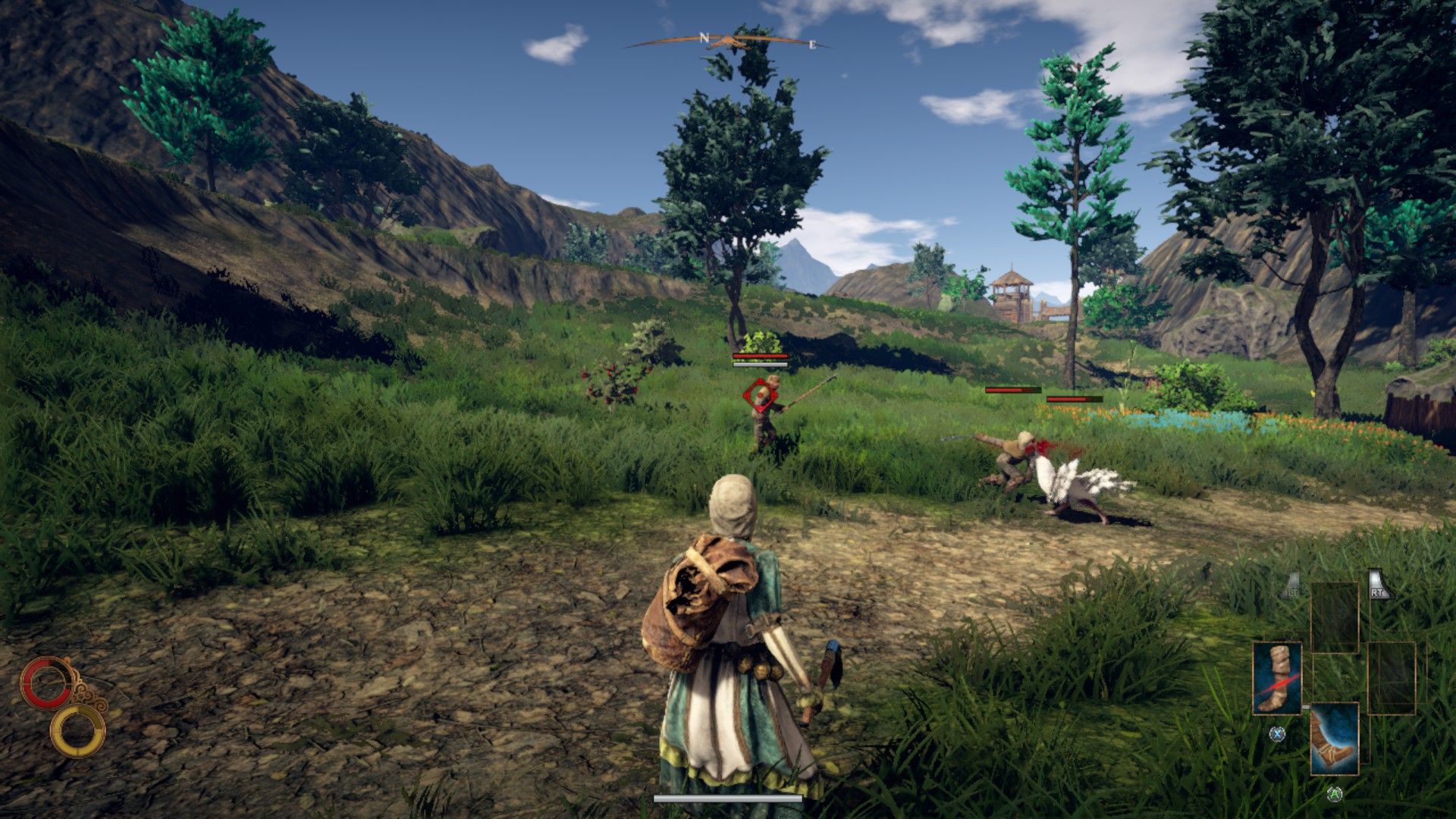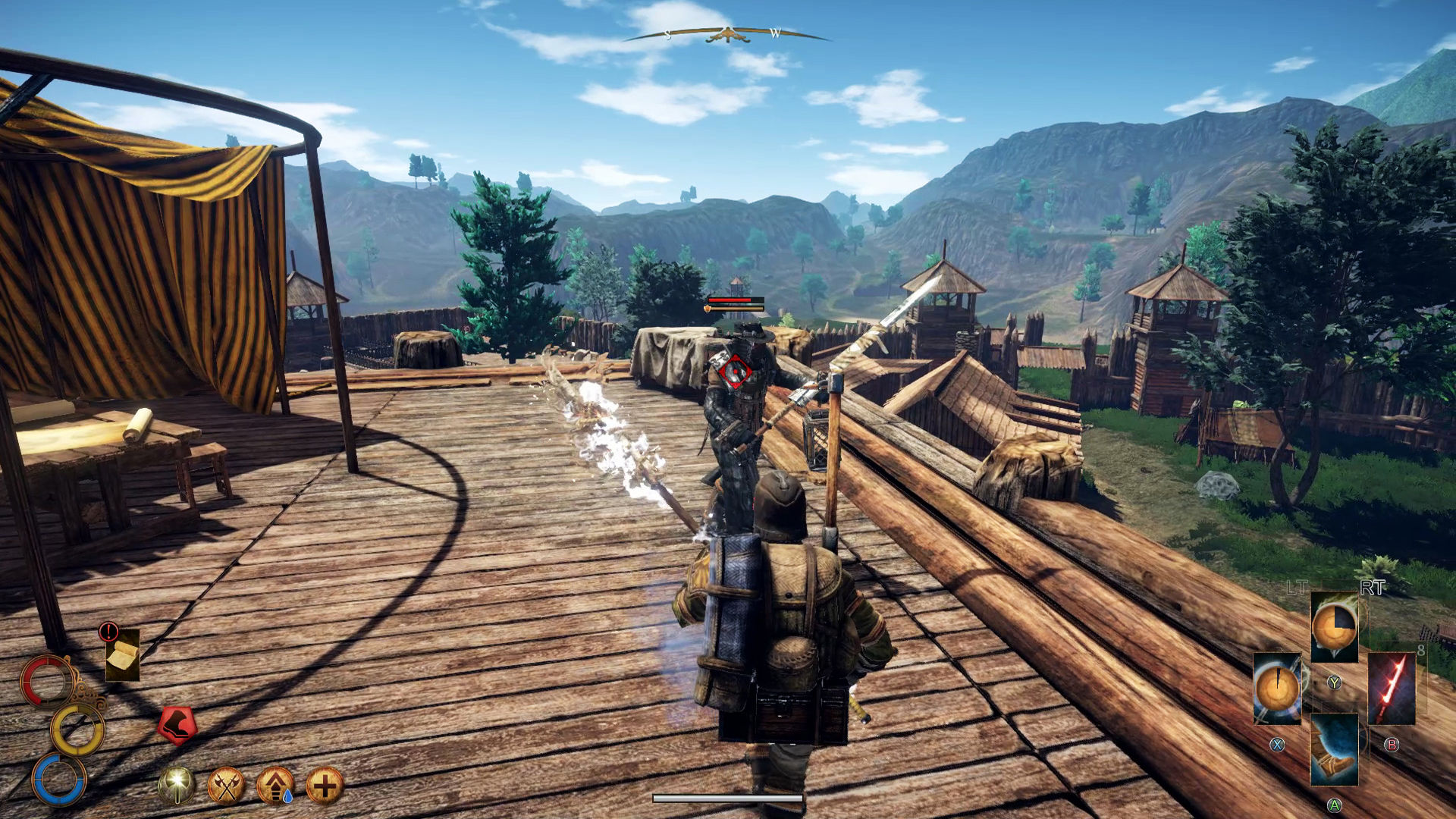Search
[{{{type}}}] {{{reason}}}
{{/data.error.root_cause}}{{{_source.title}}} {{#_source.showPrice}} {{{_source.displayPrice}}} {{/_source.showPrice}}
{{#_source.showLink}} {{/_source.showLink}} {{#_source.showDate}}{{{_source.displayDate}}}
{{/_source.showDate}}{{{_source.description}}}
{{#_source.additionalInfo}}{{#_source.additionalFields}} {{#title}} {{{label}}}: {{{title}}} {{/title}} {{/_source.additionalFields}}
{{/_source.additionalInfo}}- Details
- Category: PlayStation 4
- By Cinque Pierre
- Hits: 4980
Outward (PS4)

Outward
Developed By: Nine Dots Studio
Published By: Deep Silver
Released: March 26, 2019
Available On: PlayStation 4, Windows, Xbox One
Genre: Role-Playing
ESRB Rating: M for Mature: Blood and Gore, Partial Nudity, Violence
Number of Players: up to two players split-screen or online
Price: $39.99
(Amazon Affiliate Link)
Thank you, Deep Silver and Nine Dots Studio, for sending us a review code!
I see that your curiosity has gotten the better of you, traveler. You want to go on another adventure—one that feels truly unknown. One where you fight for survival at every turn. If those were the words that make you sweat with anticipation, come to the world of Aurai. Outward, developed by Nine Dots Studio, is an open-world RPG where a deeply rewarding experience awaits those who are willing to best it.
In the world of Aurai you are not some chosen one, nor are you the hero of legend or even the last surviving member of a clan. You’re just some random citizen who happened to survive a shipwreck from a return voyage. Shortly after being brought home, you are politely greeted by your angry neighbors. A Blood Price has put on you since you are missing on four months of payments and you only have five days to either pay 150 silver or earn a Tribal Favor or you will lose access to your home, the lighthouse. The first thing that Outward teaches you is that some of the quests you will partake in are time sensitive. After you are given the bare essentials, you are then set off to do whatever you want.
Outward hosts survival mechanics such as the typical hunger and thirst mechanics. Typically I groan whenever I see mechanics like these, but Nine Dots tied them towards a buff/nerf system. They are not required towards living or not, but you will want to tend to them to have as smooth an adventure as you can. Other survival mechanics include sleep and comfort. Getting adequate sleep, just like in real-life will keep your health and stamina healthy. Comfort level actually relates to the weather. Weather effects such as rain, snow, and extreme heat can occur and some of these have higher chances of happening depending on where you are. Be sure to dress appropriately or you’ll fall ill. The world changes from day to night constantly; all sorts of beasts and bandits will lurk through the shadows when the sun sets. No one is stopping you from traversing the darkness, but don’t say I didn’t warn you.
Every adventurer should be prepared to face whatever challenges await, which is why you need an appropriate backpack for your travels. Backpacks are not automatically equipped, nor do they belong to an upgrade system. They must be manually acquired and can be dropped at any point. The essentials can range from potions, bandages, and antidotes to keep you healthy, rations and waterskin (water pouch) to keep you well fed, materials to fix your weapons and items, and other items like firewood and a portable tent to rest safely. Getting from one major city to the next is quite the journey in itself. For those who are used to a fast travel system—there is none in Outward so everything must be traversed by foot. Even the map ingame doesn’t mark where you are, only the general layout and some landmarks. A realistic experience that rarely holds your hand. These (lack of) features may alienate a large group of video game players, but Nine Dots did this purposely—to provide a challenge for the people who may have grown up with these kinds of games.

Strong Points: Good sense of immersion; incredible enemy design and great use of color; split-screen co-op
Weak Points: Combat can feel clunky, especially during the beginning; huge open world that feels a bit too empty at times; difficult, although for the wrong reasons; bugs such as crashes and moments where music does not play
Moral Warnings: Mystical and mythological creatures ranging from manticores to the undead; enemies bleed when struck; very mild language such as “d*mn”; the world practices monotheism and have a god that the inhabitants can worship—one of which you can pledge your loyalty to; some bodies can be seen hanging from posts, said bodies are typically half naked; there are a lot of classes that use magic and at least two of them are occult-based
When you finally get into your first few fights, the combat takes center stage. Truthfully, the combat can feel clunky especially in the beginning. Hits feel weightless and cumbersome, enemies rarely stagger and everyone outclasses you quite hard. You’ll start off with light and heavy attacks, tied to your stamina. Successfully blocking attacks also decreases your stamina as well as running or dodging attacks. Health is fairly self-explanatory, but Outward does something somewhat unique with them. The more damage you take or the more actions you use that consume stamina, the lower your maximum health or stamina becomes. The only way to fully recover these bars is to get a good night sleep. Of course since the world hates you and wants to see you suffer, you’ll probably be low on both of these for the first ten hours. There are a few ways to make combat a bit easier such as dodging to the opposite of the enemy’s dominant hand or temporarily dropping your backpack to give you faster movement.
Problems with the supposed difficulty of Outward show in the early parts. In most cases, your armor will consist of simple cloth and your weapon will most likely be something basic like a stick or a machete. You’ll quickly come across bandits (who love to attack in groups by the way), mythical creatures who can potentially take you out in one hit while also taking a long time to kill, knights and mages, and traps that will cause you to bleed to unconsciousness. In Outward, you never actually die. You’ll fall to unconsciousness no matter how hard of a beating you take and a few scenarios can play out. If you are beaten by bandits, you’ll typically be taken to their camps. If you happen to fall from a negative effect such as bleed or poison, you might just be saved by a traveler and brought to an inn. Outward starts off hard, but more in an “unfair” sort of sense, but progressively gets easier as the game goes on—and not because you’re exactly getting “better” at the game either.
Possibly the third thing you may have noticed is that there is no leveling up whatsoever. A lot of you might be used to the whole leveling up aspect of most RPGs, but the “role-playing’ part of Outward comes from the uses of skills. Skills are taught by teachers and trainers, usually for money. Many of these skills belong to a skill tree and this is when you can become one of eight “classes” or a hybrid of two. These classes can range from the typical rogue and warrior to the not-so-typical rune sage and Kazite spellblade. This is where the combat starts to find its legs but also where it gets a lot easier. Active skills can be assigned to one of eight shortcut slots and these classes rely a lot on both the active, passive, and breakthrough (a special kind of passive) skills—all of them being very powerful. Once I was able to get my rune sage going, I was more or less a walking maelstrom of destruction. The rune sage, in particular, feels great as you have to combine certain runes together to attack, defend, or heal. The enemies that once were giving me difficulty, I was able to effortlessly stomp into the ground. Even the supposed late game enemies were barely able to touch me. I feel that the overall difficulty was done the wrong way because of this oversight.
Outward and the world of Aurai is very pleasing to look at. The graphical fidelity isn’t all that amazing as the textures themselves look like a game that came out in the late 2000s. Nine Dots compensates the lack of graphical prowess with great use of color. There is one particular area (within the starting area of Chersonese) that is filled with purple flowers—and the transition into the area is absolutely beautiful. The visuals only go up from there when you start to reach other areas such as the Hallowed Marsh and Enmerkar Forest. The creatures also look fantastic and I feel that the design of these enemies is Outward’s strongest feature. They are simply incredible and seeing the next mythical beast left me more surprised than the last. The music also complements the atmosphere and although most of it is the typical “adventure” music, there are a few standout pieces such as the music that plays in the town of Monsoon; filled with whimsy, curiosity, and a sense of relaxation.
Did you know that all of this can be experienced with a friend? Outward has a co-op feature, that also extends to local split-screen. If playing through online, you can make your session available for a friend to join at any time. Due to no matchmaking, I was unable to utilize the online features but was able to do local co-op for a few hours. The game runs basically the same, but with a friend—and some frame drops. Items and loot can be shared amongst each other. Perfect with a friend or your other half.

Higher is better
(10/10 is perfect)
Game Score - 70%
Gameplay - 14/20
Graphics - 8/10
Sound - 7/10
Stability - 3/5
Controls - 3/5
Morality Score - 56%
Violence - 4/10
Language - 8/10
Sexual Content - 6/10
Occult/Supernatural - 0/10
Cultural/Moral/Ethical - 10/10
In about seven sessions of me playing prior to this review, each lasting around five hours on average, I managed to run into a crash or some kind of graphical or sound bug at least once. Maybe I’m just unlucky, but I’m assuming that the crashes I’ve experienced were the real reasons as to why the game has an autosave feature. But hey, if a small team of ten can make a game where its worst stability issues are some crashes here and there I’d say they’re doing a pretty good job, unlike another company with a couple of wildly successful RPGs under their belt.
Like any adventure, you’ll come across some rather questionable aspects. Early in the game, you’ll have the choice of joining one of three factions. One of the available factions is called The Holy Mission of Elatt. The Holy Mission of Elatt is a religious faction, and Elatt is the god of discipline. Other things include mythical creatures such as manticores, giants, wendigos, and undead creatures like skeletons and liches. Magic is very common throughout the world; both you and your enemies have access to them. The philosopher and mage are more or less based on the teachings of Elatt.
Violence is a given, and enemies bleed when hit. Interestingly enough, corpses tend to linger around even when loading into another area. There are moments where bandits tend to hang bodies from the outsides of their camps. These bodies are also half naked of both the male and female variety. No genitals are shown, however. Mild language is uttered through dialogue, but the worst I heard was “d*mn.”
If you ever had a conversation with a friend, colleague, or even a conversation with an online stranger and they recommended you a game while saying something along the line of “it gets good twenty hours in!”—Outward happens to be one of those games. However, Outward also has a lot of features that don’t appeal to a mainstream audience, rather taking pride in their nicheness. If you’re not part of the intended audience of hardcore, authentic features you will not like this game no matter how many hours you put into it. Beneath its flaws and issues is a game with passion and heart behind it. If you do happen to be part of the intended audience, you’ll love the sense of immersion that Outward presents, especially with a friend. A current game with split-screen co-op campaign deserves recognition as it is becoming increasingly rare these days. Also, anything is more fun with a friend.
Outward ended up being one of the more polarizing games I’ve played this year, whether it has to do with its mechanics or morals. There are aspects of this game that I really adore, yet there are other aspects that gave me great annoyance. I may not exactly have a love for Outward due to the fact that I found myself quite bored with it half the time; however, I can still see that it is a satisfying game if it happens to appeal you. Get it with a friend, and if you have the choice, get it for the PC as the general text, layout, and controls seem to be more designed with a keyboard and mouse in mind. If everything that I’ve said still hasn’t deterred you from Outward, keep this one in your sights as there are plenty of surprises that I have not touched upon. You can easily get at least a hundred hours out of it as there is a lot that this world can offer.






